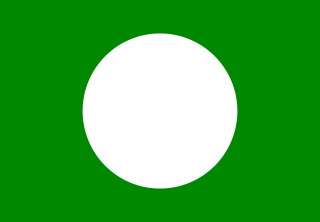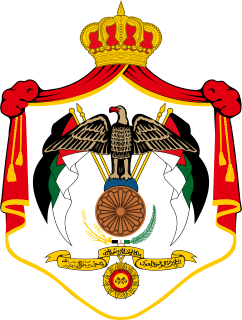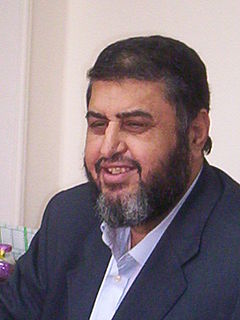Islamism is a political ideology which posits that modern states and regions should be reconstituted in constitutional, economic and judicial terms, in accordance with what is conceived as a revival or a return to authentic Islamic practice in its totality.

The Society of the Muslim Brothers, better known as the Muslim Brotherhood, is a transnational Sunni Islamist organization founded in Egypt by Islamic scholar and schoolteacher Hassan al-Banna in 1928. Al-Banna's teachings spread far beyond Egypt, influencing today various Islamist movements from charitable organizations to political parties—not all using the same name.

The National Assembly is the lower house of the bicameral French Parliament under the Fifth Republic, the upper house being the Senate. The National Assembly's legislators are known as députés.

The Pan-Malaysian Islamic Party is an Islamist political party in Malaysia. PAS's electoral base is in Peninsular Malaysia's rural and conservative north and east coast.

The Movement of Society for Peace, sometimes known by its shortened form Hamas is an Islamic party in Algeria, led by Mahfoud Nahnah until his death in 2003. Its current leader is Abderrazak Makri. It is aligned with the international Muslim Brotherhood.
There exist a number of perspectives on the relationship of Islam and democracy among Islamic political theorists, the general Muslim public, and Western authors.

Elections in Jordan are for the lower house, known as the House of Representatives, of the bicameral parliament of Jordan, as well as for local elections. They take place within a political system where the King has extensive legislative and executive powers, retaining ultimate political control. The Prime Minister is selected by the King, the PM is then free to choose his own Cabinet. The parliament has quotas: three seats for Circassians and Chechens, nine for Christians and fifteen for women. The electoral system favours rural tribes and those of East Bank origin over urban areas that are primarily inhabited by those of Palestinian descent.

The Alternative Democratic Reform Party is a conservative and mildly populist political party in Luxembourg. It has four seats in the sixty-seat Chamber of Deputies, making it the fifth-largest party.
The History of the Muslim Brotherhood in Egypt (1954–present) encompasses the History of the Muslim Brotherhood in Egypt from its suppression under Nasser to its formation into the largest opposition bloc in the Egyptian parliament. The Brotherhood operates under the slogan "Islam Is the Solution," and aims to establish a democratically introduced civic Islamic state. It has been described as "a deeply entrenched force, with hundreds of thousands of members and affiliates across the Middle East".
The History of the Muslim Brotherhood in Egypt (1928–1938) discusses the History of the Muslim Brotherhood in Egypt from the Brotherhood's inception to its development into a viable political force.
The Muslim Brotherhood is an Islamic organization that was founded in Ismailia, Egypt by Hassan al-Banna in March 1928 as an Islamist religious, political, and social movement. The group spread to other Muslim countries but has its largest, or one of its largest, organizations in Egypt, where for many years it has been the largest, best-organized, and most disciplined political opposition force, despite a succession of government crackdowns in 1948, 1954, 1965 after plots, or alleged plots, of assassination and overthrow were uncovered. Following the 2011 Revolution the group was legalized, and in April 2011 it launched a civic political party called the Freedom and Justice Party (Egypt) to contest elections, including the 2012 presidential election when its candidate Mohamed Morsi became Egypt's first democratically elected president. One year later, however, following massive demonstrations, Morsi was overthrown by the military and arrested. As of 2014, the organization has been declared a terrorist group by Russia, Egypt, UAE, Saudi Arabia and is once again suffering a severe crackdown.
Elections for the sixth Knesset were held in Israel on 2 November 1965. Voter turnout was 85.9%.

The French Directory election of 1798 was held between 9 and 18 April 1798 and marked the beginning of the end of the French far-left and rise of the anti-mountain and anti-jacobin parties in France. The 1798 elections were partially invalidated by the passage of the Law of 22 Floréal Year VI which saw 106 members of the mountain lose their seats by decree of the Council of Five Hundred.

The 2008 Egyptian municipal elections were local elections held across Egypt on 8 April 2008.

Parliamentary elections were held in Egypt in 2010. The first stage was held on 28 November 2010 and the second round was held on 5 December 2010.

In Egypt, the Muslim Brotherhood – a Sunni Islamist religious, political, and social movement – is, or was, considered the largest, best-organized political force in Egypt, with adherents estimated to number between 2 and 2.5 million. Founded in Egypt by Hassan al-Banna in March 1928, the group spread to other Muslim countries but has its largest, or one of its largest, organizations in Egypt, despite a succession of government crackdowns in 1948, 1954, 1965, and 2013 after plots, or alleged plots, of assassination and overthrow were uncovered.

The Ennahda Movement, also known as the Renaissance Party or simply known as Ennahda, is a self-defined Islamic democratic political party in Tunisia.

Mohammed Khairat Saad el-Shater is an Egyptian engineer, businessman and Islamist political activist. A leading member of the Muslim Brotherhood, as the Deputy Supreme Guide, el-Shater was the initial candidate of the movement's Freedom and Justice Party during the 2012 Egyptian presidential election before being disqualified by the election commission. Previously, he was the deputy chairman of the Brotherhood.

The Freedom and Justice Party is an Egyptian Islamist political party. The ex-president of the party, Mohamed Morsi, won the 2012 presidential election, and in the 2011 parliamentary election it won more seats than any other party. It is nominally independent, but has strong links to the Muslim Brotherhood of Egypt, the largest political group in Egypt. The party was banned and dissolved in 2014; however, it continues to function underground.

General elections were held in Jordan on 20 September 2016 to elect the 18th House of Representatives. The elections were announced after parliament was dissolved by King Abdullah II on 29 May 2016, with the King appointing Hani Mulki as interim Prime Minister following the resignation of Abdullah Ensour.
















